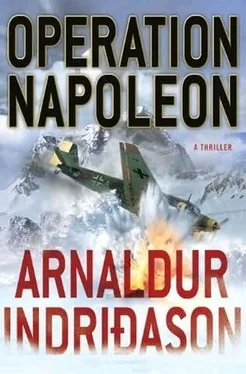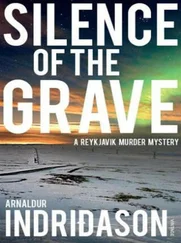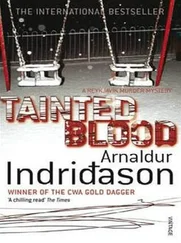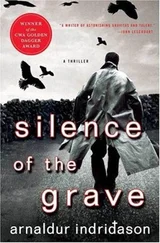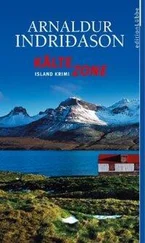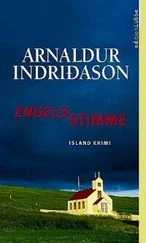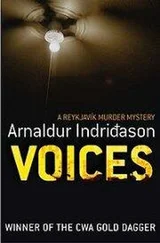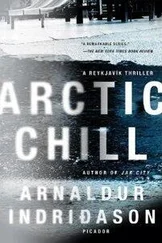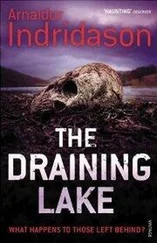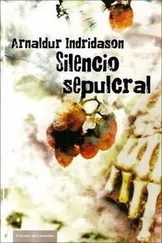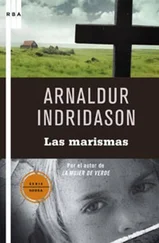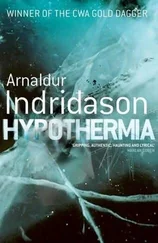Straightening up again, he ordered his men to free the body from the ice and take it into one of the tents. He wondered how long the passengers had survived after the crash-landing. The accident had happened at this time of year. Ratoff and his men were clad in special Arctic-survival gear but even so the cold pierced them to the bone. They also had the gas lamps and had been specially trained to endure the cold. The passengers of the plane, on the other hand, would have been utterly defenceless. Those who survived the crash must have slowly frozen to death. It could not have taken many days.
Thirty-five miles away, eight members of the Reykjavík Rescue Team stood staring down into the blue depths of a jagged fissure in the ice, from which they could hear the faint ringing of a mobile phone. They had set out shortly before daybreak and soon found the tracks of the snowmobiles; the trail had changed direction about two hours from the team’s base camp, heading due west towards a large belt of crevasses. Back at camp they succeeded in pinpointing the mobile phone signal and the rest had been easy. The snowmobiles appeared to have careered into the chasm at full speed, as if Elías and Jóhann had not seen it coming until it was too late.
One of the rescue team lowered himself into the crevasse on a rope; his two comrades lay at a depth of about eight metres. As he came alongside them, he could see that their injuries were horrific, as if they had crashed repeatedly into the walls of the fissure as they fell and the snowmobiles had then landed on top of them, rendering them almost unrecognisable. Their faces were reduced to raw, featureless pulp; eyes obscured by a mass of swelling, ears bloody clumps, bodies twisted into unnatural shapes as if every bone in them were broken. He had never seen anything like it before and, turning his head away, he vomited.
The team set to work, first hauling up the snowmobiles, then lowering stretchers on to which they strapped Elías and Jóhann. These they raised in turn with slow care to avoid bumping the battered bodies against the ice walls, and set the stretchers in the back of the team’s snow-cat. A bitterly cold north-easterly had started to blow, whirling up loose snow which cut into any exposed skin like razorblades and soon hid all sign of their tracks around the crevasse.
Júlíus stood watching the operation, his head bowed, oblivious to the cold. He had been leading expeditions for fifteen years; there had been accidents and injuries before but nobody in his charge had ever died. Now he had lost two young men for whom he was responsible, two boys whom he had given permission to leave camp to test-drive the new snowmobiles. He might have known they would get carried away, forget the time and end up in trouble, but this was far beyond his worst imaginings. He heard someone calling him from the vehicle. One of the volunteers, a medical student called Heimir, was resting two fingers over Elías’s neck. Júlíus waited, holding his breath.
‘It’s weak but there’s still a pulse,’ Heimir announced.
‘He’s alive?’
‘Just about. But I doubt he’s got long.’
‘Can we tend to him here or should we take him back to camp and summon a helicopter?’
‘Like I say, he could go at any minute. It’s probably safest not to try and move him. We should do the best we can and call the helicopter. How quickly can it get here?’
‘It shouldn’t take long,’ the leader said, switching on his radio. ‘But I still think we should get him out before the storm hits. There’s severe weather expected any minute and we’d be better off back at camp than in the open. Let’s move.’
Suddenly Elías gave a faint moan. His blue lips moved slightly.
‘Is he trying to say something?’ Júlíus asked.
Heimir bent down to Elías’s bloodstained face and laid his ear to the boy’s mouth. After a minute he straightened up and looked at Júlíus.
‘He’s drifting in and out of consciousness.’
‘Did he say anything?’
‘It was very unclear. I think he may have said “Kristín”.’
‘Yes, he would,’ Júlíus said. He remembered how he had assured her that Elías was safe and a pang of self-recrimination went through him.
But when he called the Coast Guard helicopter it transpired that the only available aircraft was currently fetching a wounded fisherman from a trawler halfway between Iceland and Greenland. In cases when the Coast Guard could not get to the scene, it was customary to call the Defense Force at Keflavík Airport and ask them for help. Júlíus was assured that the Coast Guard would contact the Americans and ask them to send a helicopter to pick up the two men.
Why had Elías’s sister thought he was dead? Júlíus wondered, as he walked back to the edge of the crevasse and looked down into the chasm. How could she have found out before us?
He dreaded having to tell her that she was right. Elías was not dead yet but he was unlikely to pull through. His injuries were severe, he had been lying in the ice for hours, and he would certainly be hypothermic. Júlíus scanned the horizon, willing the helicopter to arrive before the storm struck. It was Elías’s only hope.
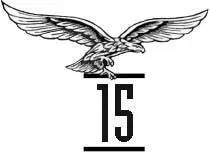
US EMBASSY, CENTRAL REYKJAVÍK,
SATURDAY 30 JANUARY, 0100 GMT
She woke up at the third ring. Monica Garcia worked as the director of the Fulbright Commission in Iceland, an educational exchange programme based at the US embassy in Reykjavík, where she had an apartment. She disliked being called in the middle of the night and stirred sleepily; she had been hoping for a peaceful night after the extraordinary last twenty-four hours at the embassy. But the strident ringing persisted until at last she propped herself up on her elbow and snatched up the receiver.
‘Monica?’ said a voice.
‘It’s one in the morning,’ she protested, registering the luminous numbers on her radio alarm. ‘Who is this?’
‘It’s Steve. I’m sorry, but it’s an emergency.’
‘Steve? Why are you calling me in the middle of the night?’
‘I think some men from the embassy are trying to kill me.’
‘Why would anyone want to kill you, Steve? What have you been smoking?’
Groping for the lamp on the bedside table, she switched it on, just managing to avoid knocking over a glass of water and dislodging a small pile of books on which an open copy of War and Peace lay uppermost.
‘Two men, both around six foot, blond, neatly dressed in civilian clothes. They’re after my friend as well. I told you about Kristín. She knows something about military activities on Vatnajökull and whatever it is, it’s important enough for them to send paid assassins round to her house. She came to the base to find me, and the men turned up at my place shortly afterwards but we managed to escape.’
‘She fled to the base? Steve, I don’t understand a word of this.’
She sat up in bed and shivered: the room was freezing as the radiator had broken again.
‘I know, it’s complicated. I’ll explain later but you have to trust me.’
‘Where are you now?’
‘I’m still on the base. What’s going on at the embassy? What’s happening on the glacier? Do you know?’
‘Everything’s been turned upside down. That’s all I can tell you. I’ve no idea why.’
‘How do you mean upside down?’
‘Military intelligence has assumed control by direct order of the defense secretary. Some sort of special operations personnel showed up, took over everything and sent the ambassador on leave. Three special forces companies landed at Keflavík just over twenty-four hours ago and may well have gone to Vatnajökull, for all I know. Beyond that I really don’t know what’s going on. It’s as if there’s been a military coup. They installed a whole load of computer equipment – I don’t have a clue what it’s for – and set up a command and control centre. The embassy staff aren’t being told anything. We’ve been ordered to stay out of the way and keep our mouths shut. They say they’ll only be here for a few days.’
Читать дальше
